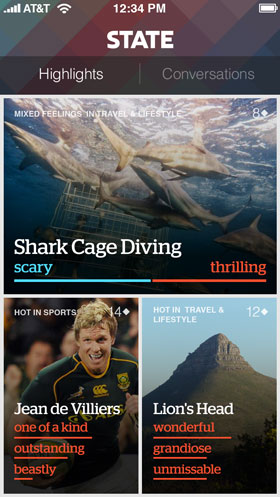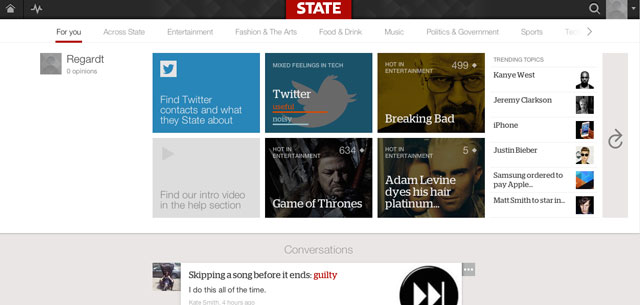
State, a fast-growing international social communications network built around user sentiment and personal opinion, has been launched in South Africa.
The London-based State was founded by British-Lebanese entrepreneurs and brothers Alexander and Mark Asseily. They want to change the way we look at social networks by delving straight into the data that drives us — our opinions.
State’s advisors include Web inventor Tim Berners-Lee and controversial author Deepak Chopra.

The Asseily brothers have a strong track record in technology start-ups. Mark has held early positions at Skype, Rebtel and Moxi, while Alexander founded Jawbone, a consumer technology and wearable products company.
Launched earlier this year in the US, State is a new media platform where personal connections don’t matter, but where your opinion does.
Alexander Asseily tells TechCentral that people have a lot more in common than they think. How we interact with each other is not always based on who we know, but rather around the conversations that excite us.
“The idea is to empower people’s opinion, and that’s why we call it a ‘global opinion network’,” says Asseily. State has social dimensions to it because people are talking to each other, but the reason why it’s an opinion network is because the connections among people, and between people and content, are semantic and not social, Asseily says.
The connection that State builds between people is based on a shared interest and point of view. Asseily says this is important because it dissociates people’s social reach from the nature of the communication.
State’s user interface feels like a mixture of some of today’s most popular social networks, but it works very differently. The platform allows users to post an opinion on any topic by using one of more than 10 000 emotive words. Users can also add their own sentiments should the existing library not be sufficient. Once posted to State, an opinion will join millions of others shared by State’s users.
The user interface has been developed to bring the data to the front and visually indicate where users’ opinions rank with others. Users can further entrench their opinions in an open discussion on the site, or share them with Twitter and Facebook.
State has also made available a basic application programming interface (API) that allows third-party developers to tap into some of its features. However, Asseily says a full third-party API will be available nearer the end of the year that will give developers much deeper access to State’s data.
The company has also just announced the Stateclip, a browser add-on that lets users capture and share opinions as they browse the Web.
In order to provide access to State to a broader audience, the company recently announced its iOS app and said it plans to launch an Android version in the next few weeks.

Localisation is the next big step for State. State’s entry into South Africa was timed to coincide with this week’s national election.
“During its elections, all eyes are on South Africa,” says Asseily. “We want to make the State Web platform and our latest mobile app for iPhone available to all South Africans so they can debate the issues and see how voter sentiment is shaping up,” he says.
“We are used to living in a world that is black and white, and everything is polarised, but we are continually being exposed to what is called the ‘nuanced middle’, which reflects the views of the majority of people and, if you look at the data, is quite balanced on a range of topics. State enables us to view a better perspective on these conversations.” — (c) 2014 NewsCentral Media




